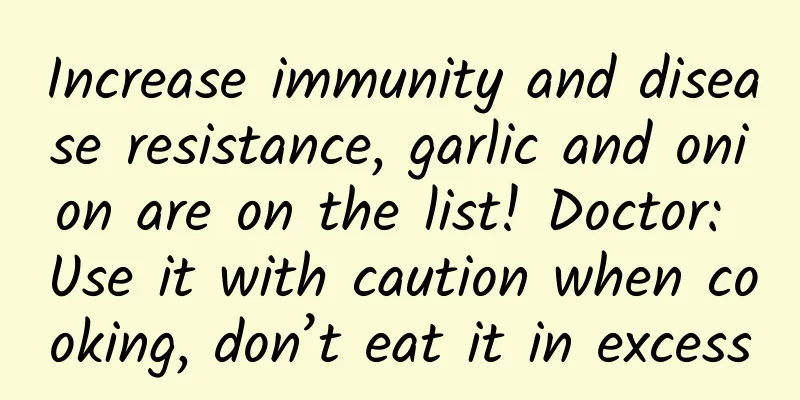Increase immunity and disease resistance, garlic and onion are on the list! Doctor: Use it with caution when cooking, don’t eat it in excess

|
In order to prevent the epidemic, many people have stayed at home and their stored food has almost been eaten up. Therefore, traditional markets have begun to see crowds of people shopping for restocking. How can we buy good ingredients safely and quickly, especially which ingredients can enhance immunity and build health protection? Nutritionists specially share good ingredients including garlic, onion, turmeric, etc., and recommend using them in moderation in cooking for healthy eating. According to the journal Phytotherapy Research, past studies have found that the following foods, including licorice, garlic, onion, turmeric, soybeans, figs, pomegranates, black pepper, papaya, bitter orange, plums, and guava, all contain ingredients with immune-regulating and disease-fighting functions. Don’t crowd into traditional markets, stay home and build good immunity During the tense period of the epidemic, many people were seen crowding into traditional vegetable markets and hypermarkets to buy vegetables. Dr. Xu Shuhua, a family medicine doctor at Fu Jen Catholic University Hospital, first called on everyone not to gather in traditional markets. To avoid community infection, you may choose to buy vegetables online, but which fruits and vegetables should you buy to better protect your health? In fact, staying home and staying healthy can also help you develop good immunity! Dr. Xu Shuhua said that if staying at home and watching the news makes you anxious, you might as well use the following ingredients with "antiviral" benefits and make a few dishes as appropriate! However, let me reiterate that it is only recommended that these food ingredients be used in cooking in moderation, and do not consume them in excess! Dr. Xu Shuhua recommends that these food ingredients can be used in moderation in cooking, but don’t eat them in excess! (Photo taken from Xu Shuhua’s Facebook) Research: Garlic, onion, and turmeric are all on the list of immune-enhancing drugs Dr. Xu Shuhua said that according to the journal Phytotherapy Research, past studies have found that the following foods, including licorice, garlic, onion, turmeric, soybeans, figs, pomegranates, black pepper, papaya, bitter orange, plums, and guava, all contain some immune-regulating and antiviral ingredients. Adding these ingredients or fruits to your daily diet may help boost your immune system, reduce the risk of infection, or aid in recovery in the event of a COVID-19 infection. You can consider eating them or adding them to your dishes. Previous studies have shown that by affecting the synthesis of viral proteins such as hemagglutinin, neuraminidase and matrix protein, turmeric can help reduce the amount of influenza virus by about 90% in cell culture experiments at a concentration of 30μM. Eat good food to get the nutrition, help regulate immunity and increase disease resistance The research mainly points out that the nutrients in the above plants have the effect of immunomodulators, which can enhance humoral immunity and cellular immunity, and can also activate non-specific immune responses, such as activating natural killer cells, macrophages, and the complement system, thereby enhancing resistance to infection. (1) Take licorice as an example: In theory, the glycyrrhizin contained in licorice root can inhibit viral replication, adsorption and penetration. Glycyrrhizin can enhance the production and expression of nitrous oxide in macrophages, thereby assisting in inhibiting viral replication. (2) Take turmeric as an example: Previous studies have shown that by affecting the synthesis of viral proteins such as hemagglutinin, neuraminidase and matrix protein, turmeric can help reduce the amount of influenza virus by about 90% in cell culture experiments at a concentration of 30μM. The other plants and foods mentioned above also showed high antiviral activity, especially against viruses that cause respiratory problems. However, Dr. Xu Shuhua reminds us to be careful not to take it crazily! Excessive consumption can also have adverse effects on the human body. For example, the acceptable daily intake of glycyrrhizin is 0.2 mg/kg/day. If the consumption is high, the main side effects are increased blood pressure and hypokalemia. People with cardiovascular, kidney and blood pressure problems should be more careful when using it! Take garlic as an example. Although the Food and Drug Administration (FDA) believes that garlic is safe for the human body, if it is consumed in high doses, especially on an empty stomach, it can cause some discomfort, such as diarrhea, dizziness, nausea, vomiting, headache, etc. Therefore, if you cook at home, you can consider adding the above ingredients into the dishes in moderation, which can soothe your mood and improve your health. Dr. Xu Shuhua writes a diary with you Facebook |
Recommend
Is it true that stress makes you gain weight? Research says...
A bakery manager once came to consult about weigh...
Menstruation delayed for half a month
Menstruation delayed for half a month A delay of ...
Can eating green peppers and guava really prevent dark spots? Nutritionist Xia Ziwen: 4 nutrients to fight dark spots
The temperature soared to 30 degrees, and if you ...
Burdock is a starchy vegetable. Will eating too much make you fat? Nutritionist Liu Yili: Don’t make the mistake of eating burdock for health preservation
Burdock is a common side dish in Japanese cuisine...
What is an ovarian cyst in early pregnancy?
Ovarian cysts in early pregnancy may be related t...
What is the treatment for chronic pelvic inflammatory disease?
Chronic pelvic inflammatory disease is a chronic ...
Patients' families should pay attention to the care methods of vaginitis as early as possible
According to the survey, vaginitis is a common gy...
How to diagnose female pelvic peritonitis
Pelvic peritonitis is a common gynecological dise...
What actions can cause miscarriage?
Generally, there is no saying that "some act...
What are the dangers of severe cervical erosion?
Cervical erosion can be divided into three catego...
What are the dangers of abortion to women? See what doctors say
In fact, abortion should be a very minor operatio...
Weight gain after the New Year! How to avoid the yo-yo effect? Nutritionist Jian Yuhua: Balance negative energy to lose weight easily, beware of 4 landmines
According to traditional concepts, the Lunar New ...
Patients with cervical erosion generally experience vulvar itching and pain
Patients with cervical erosion generally experien...
Can I drink alcohol while working out? Will drinking make you fat? Remember these four key points, it’s okay to party occasionally
Can I drink alcohol while exercising? Will drinki...
How to treat cervicitis to completely eradicate it
There is no way to completely eradicate cerviciti...









